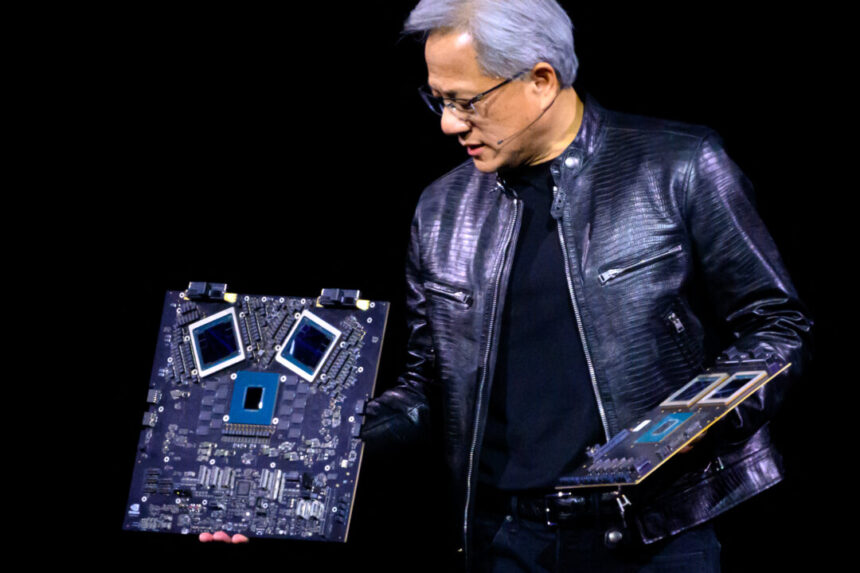High-tech firms in China are experiencing a decline in profits, leading them to reassess their market strategies.
This decline is attributed to restrictions imposed by the United States and its allies, which have made it challenging for China to access advanced semiconductors and the technology needed to produce them. This shift is evident in global artificial intelligence conferences, where discussions related to China have noticeably decreased.
In response, the Biden administration announced updated regulations on March 29 to further restrict China’s access to American AI chips and the equipment required for their manufacturing. These measures aim to prevent the export of advanced AI chips to China, with concerns that such technology could enhance the military capabilities of the Chinese Communist Party.
The revised regulations, set to take effect on April 4, expand export restrictions to include laptops and other devices containing these advanced chips. The enforcement of these updates will be immediate, unlike previous years where a 30-day notice period was given.
Additionally, the United States is planning to identify Chinese semiconductor manufacturers that will be prohibited from acquiring essential manufacturing tools, further limiting China’s access to critical technology. This list of targeted facilities is expected to be released soon.
As a result of these restrictions and escalating technological competition with the United States, Semiconductor Manufacturing International Corporation (SMIC), China’s leading chipmaker, reported a significant 60% decrease in net profit last year. This marks the first profit decline for SMIC since it faced U.S. sanctions in 2020.
Furthermore, the United States has been urging its allies, such as the Netherlands, Germany, South Korea, and Japan, to join in restricting technological exports to China. These efforts aim to strengthen the technological embargo against China, particularly in the semiconductor sector.
During a recent visit to China, Dutch Prime Minister Mark Rutte engaged in discussions that likely focused on ASML, a Dutch firm known for supplying lithography machines for chip manufacturing. Speculations arose about whether these talks would influence the Dutch government’s decision to allow ASML to service the equipment it has sold to China.
Germany’s involvement in the semiconductor supply chain, particularly through Carl Zeiss AG’s provision of optical components to ASML, is also under scrutiny. The United States is pressuring the German firm to stop its shipments to China, while Germany is considering limiting exports of semiconductor chemicals to China.
Similar efforts are being made with Japanese firms to restrict exports of chip-making chemicals to China, with discussions expected to take place during the upcoming Japan-U.S. summit.
Other countries, such as South Korea and Taiwan, are also deliberating on aligning with the United States regarding export controls for semiconductor equipment destined for China. Taiwan, in particular, has taken steps to safeguard its critical semiconductor technologies through legislative amendments.
Personnel working in sensitive technology sectors and receiving government funding must obtain authorization before traveling to mainland China.
Jason Ma, an AI expert based in the United States, shared insights with The Epoch Times on April 2, interpreting these actions as part of a collective effort by Western countries to strategically separate from the CCP in advanced technology. These restrictions pose a significant setback for the CCP, increasing the costs associated with AI development. This unified approach reflects a broader international initiative to address concerns about national security and the competitive landscape in high-tech industries.
The “NVIDIA GPU Technology Conference (GTC)” held in San Jose, California, and online from March 18 to 21, showcased the latest advancements in artificial intelligence. NVIDIA CEO Jensen Huang delivered a keynote speech on “Witnessing AI’s Disruptive Moment,” emphasizing the conference’s role in AI innovation. Despite the event’s focus on innovation and networking, Chinese involvement was notably absent from discussions, as observed by a Chinese private equity tycoon in attendance.
The tycoon noted the lack of dialogue on China’s AI development or American companies’ perspectives on China, despite the presence of Chinese engineers and investors at the conference. This shift away from China is partly attributed to NVIDIA’s reduced financial reliance on the Chinese market, which now accounts for only 5 percent of its revenue. This trend reflects a broader disengagement from China among high-tech firms, driven by changing government policies and regulatory environments.
The evolving dynamics in the high-tech industry are prompting companies to reassess their market strategies in China, with some opting to withdraw altogether due to diminishing profits and regulatory challenges. The trend of moving away from the Chinese market is not isolated, with other companies also recalibrating their business strategies in response to shifting geopolitical and economic factors. Please rephrase this sentence.
Source link





